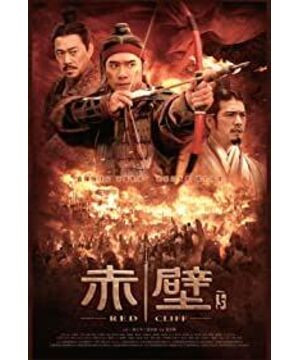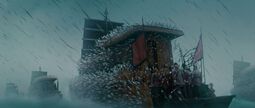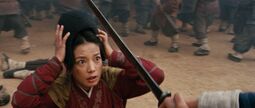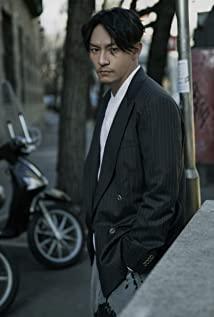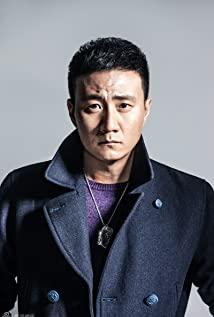went shopping for video discs and going to theaters on the second day after arriving in Beijing. What's the plan to save money? You are lucky to find a theater where you can watch the newly-painted "Red Cliff Part II" for 30 "miniatures" after 9 o'clock ---- even a grand theater, the kind with a stage, it should be very good to watch war movies. !
But after watching "Chibi", there are indeed a lot of war scenes, even a bit overwhelming, but it doesn't feel like a war genre movie, but a "hero movie" with many war scenes---- What is a hero movie? It is John Woo's favorite film, from "heroes" to "two heroes", the main line of grievances and hatreds between men is inseparable.
No wonder the Chinese audience can't bear it. "Three Kingdoms" has long taken root in popular culture, and the public "has a spectrum" about the background of the Three Kingdoms and the characteristics of the characters. It's not that we can't innovate, but it depends on how innovative it is. For example, the Korean comic "Cangtian Aviation Road" starts from Cao Cao to narrate, breaking the familiar face of the villain, and it is very popular. Because everyone knows that in the history of the Three Kingdoms, no one is completely loyal or completely bad. How can it be said that Wei Guo ran out of the Three Kingdoms, how could Cao Cao not only be a traitor in "Red Cliff", but also a fool who easily fell for "beauty tricks"?
"Chibi"'s ambition is to rehabilitate Zhou Yu, so he not only has strategy and leadership ability, but also can play and kill the enemy. More importantly, he is more benevolent and righteous than Liu Bei; although he and Kong Ming sympathize with each other, and Zhao Zilong can be sincere to Xiao Qiao The deep love, plus a pair of electric eyes, is almost perfect. Speaking of innovation, in fact, Da Dao Wu is still repeating himself, wasting the grand background of the "Three Kingdoms". Although it can be seen that he has filmed many war scenes because of "Three Kingdoms", which is indeed not seen in the previous "hero films", but the drama is always among the characters. When he returns to the main line of the character, he returns to the old routine. Just this change, it almost feels like a "spoof". Saying that Cao Cao started the war to rob Zhou Yu's wife is an example; when the two armies fought, and in the end, several characters faced each other with swords, and then said a long line of dialogue, isn't it familiar? Only almost did not replace the sword with a pistol. But this is not Huashan on the sword! It's a war! How could such a scene occur?
The relationship between the characters is even more strange: Zhou Yu said that this battle made him "make a group of friends of life and death", referring to Zhao Zilong, Guan Yu and the others; in the end, he said goodbye to Kong Ming and was so reluctant to part... After thinking about it, they would fight to the death and me , was Zhou Yu's sadness to shout "Since Sheng Yu, He Shengliang", was it meant to be ironic? But the main tone of the whole play, Da Dao Wu obviously wants to describe male friendship, and ridicule is not his style.
As for changing Zhou Yu's character to a hero of benevolence and justice, even Liu Bei, who has always been wearing the "benevolence and righteousness" mask, has become a clown, which is even more contradictory to set off Zhou Yu's "more benevolence and righteousness". How could such a benevolent person be the commander-in-chief on the battlefield, asking countless of his own people to fight each other with countless enemies? In the end, Zhou Yu released Cao Cao out of kindness, regardless of whether he would continue to wage war.
The two episodes, war and characters, have been laid out for more than four hours in the first and second episodes. Not only can they not be woven and blended well, on the one hand, it tells the characters to talk about loyalty and benevolence, and on the other hand, there is so much space to write about war scenes. , is the biggest failure of "Chibi".
From "Heroes" to "Assembly" to "Red Cliffs", one after another big movies are all about benevolence, righteousness and peace to paint the war, and the slogan "Peaceful Rise" has a worrying interpretation... But think about it again, the difference between John Woo and Zhang Yimou is that the former is not a "Chinese director" with a national theme, nor is it like those Hong Kong directors who want to break into the Chinese market, but a Hollywood director who has already faced the world. Then, the characters are made up, the plot is simplified, the big scenes are piled up, there are big heroes, big beauties, fights, resourcefulness, and bed scenes. This is the formula of Hollywood commercial blockbusters!
View more about Red Cliff II reviews


